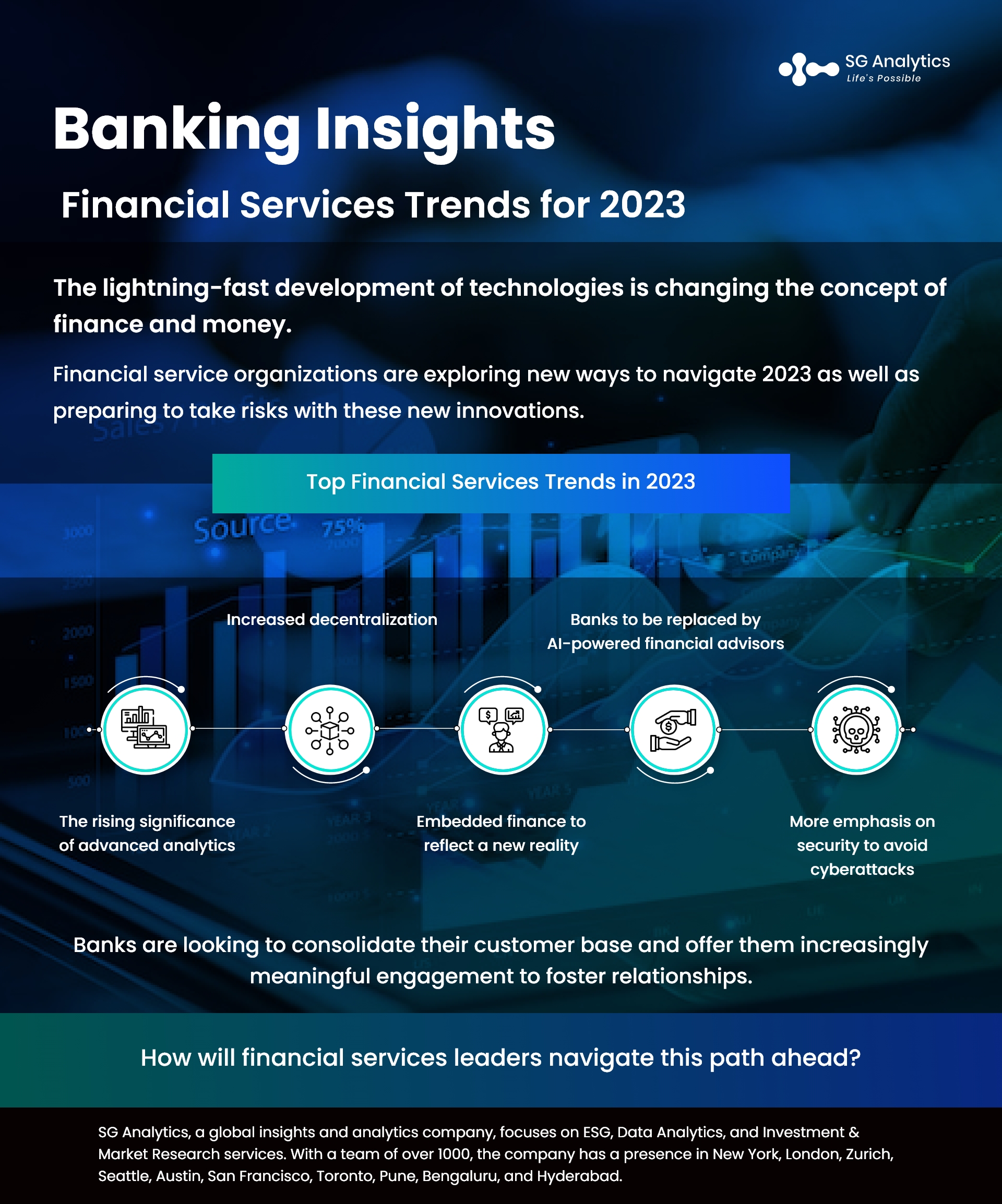The lightning-fast development of technologies is changing the concept of finance and money. This change is based on a new experience that is becoming available through digital innovation. Digital technology is democratizing the financial industry by making financial services more accessible and convenient for customers.
Financial services leaders are now applying the lessons learned from 2020 to address the looming challenges as well as to explore new opportunities. They are leaning in on smart strategy and execution while focusing on talent, technology, regulation, and purpose. While some organizations are choosing the cost-cutting route, others are planning for smarter execution by incorporating technology to add value and create superior customer experiences. Many organizations are also responding to ESG requirements defensively and focusing on what's required by finding opportunities to invest in people as well as the planet.
While financial services are focusing on accelerating new digital transformation as part of their strategic framework, the looming fears of a recession are putting a spoke in the wheel. When we dive into a few more layers and explore the framework of commercial banks, it can be identified that they are continuing to have a loyal client base but are facing fierce competition to win a greater share of corporate clients. And with high inflation and recessionary concerns, and supply chain challenges looming, the financial industry is decelerating corporate demand for capital investments.
Read more: Financial Trends: Role of Investment Banker in Banking Innovation

With the financial services sectors witnessing significant growth during the pandemic and the situation normalizing for many, growth has seen an upward trajectory, highlighting that the trend is not just a passing phase. While there is sustained growth, the exponential growth proves how the industry is quickly adapting to disruptions. However, some of the critical priorities that financial leaders should address include the following-
-
Omnichannel Engagement: Omnichannel engagement channels for customers offer a way to interact with the bank or other financial enterprises. It is, therefore, vital for them to flesh out omnichannel information exchange within their institution to ensure that any consumer data surfaces at the right time, thus assisting in building a seamless experience for them.
-
A Mechanized Medium for Customer Delight: Financial service provides work with multiple tools and gleans meaningful data from across systems to engage with customers. However, this is cumbersome and time-consuming, as well as partially successful without the right medium.
-
Tech-driven Focus: Finacial institutions are adopting new tools and technologies that are designed to facilitate smooth services. This new addition is further helping to resolve pain points and derive greater value.
Top Financial Services Trends in 2023
The financial sector has long relied on traditional methods and has recently started engaging in digital transformation. 2023 is expected to be the year where there will be opportunities that will help redefine the future, one that is driven by profits and purpose. Financial services leaders are now preparing themselves to move the industry forward.

Read more: Investing in Energy Stocks: Hottest Green Energy Stocks to Invest in
For many stakeholders, it is now becoming more critical than ever to adopt a gamified approach to deal with these challenges. And with financial service organizations exploring new ways to navigate 2023, they will also explore emerging technologies' potential. Moreover, they should prepare to take risks with these new technologies in ways they haven't imagined before.
Let's explore the future financial services trends of 2023 in terms of customer experience that will help define the integration of innovations and bring more value to customers by shaping their experience in the near future.
The Rising Significance of Advanced Analytics
Advanced analytics is today considered the key to true customer profiling and retention and omnichannel engagement. It helps in gaining a 360-degree view of the customer segment, demographics, and behaviors, enabling the financial institution to understand what customers are looking for. It also assists them in drafting a bespoke value proposition in real time. Analytics also assists in redefining every process in a financial institution and makes it more effective.
While many final institutions are already employing advanced analytics to identify fraud and risks, they need to use analytics across their processes to see significant change. European banks are combining text analytics with newer model algorithms to determine the characteristics of a customer segment that is more likely to turn to a rival bank for a loan. This enables them to develop a product to meet these customers' requirements.

Increased Decentralization
With the rise of cryptocurrencies like Bitcoin and Ethereum in the last few years, the finance sector has witnessed a rise in the attention of people wanting to invest in them. While they remain controversial and volatile, they are becoming more mainstream. However, before the collapse of FTX, experts were of the belief that cryptocurrencies could become a widely accepted form of payment. Major retailers and financial institutions were preparing to accept them as legitimate currency by 2023.
Read more: India's Union Budget 2023: Key Takeaways and Important Highlights
But with this outlook being more uncertain now, financial institutions are vowing to pursue crypto companies for violating securities laws. While cryptocurrencies still have their advocates, as people believe in the decentralized vision behind the creation of cryptocurrencies. In 2023, the industry could witness a greater start in decentralizing the banking and finance sector, which could make traditional financial institutions less significant.
Embedded Finance to Reflect a New Reality
Embedded finance is when unique, tailored financial services are delivered to consumers at the point of need by non-financial companies. And with embedded payments becoming more familiar to consumers, it is enabling financial institutions to offer their consumers the speed and convenience of paying for goods and services with just a single click.

Banks to be Replaced by AI-powered Financial Advisors
With artificial intelligence (AI) emerging as a transformative technology in 2023, the sector will witness a weighted use of tech innovations. AI holds the ability to help organizations increase efficiency, reduce costs, as well as automate their tasks, offering financial service companies a significant advantage. Eventually, the industry will witness the rise of AI-powered financial advisors offering consumers personalized financial advice.
More Emphasis on Security to Avoid Cyberattacks
As major financial services are moving online, the focus is shifting to establishing greater relevance on security gains. With increased online offerings, cyber-attacks such as phishing will likely grow in volume and intensity. Amidst this, top players in the industry are warming up to the idea of investing more in security tools and services to secure their transactions and ensure the privacy of their customer data.
Read more: Recession on the Mind – Should you be Scared or Bold to take on Markets?

Final Thoughts
With the latest trends emerging, banks are looking to consolidate their customer base and offer them increasingly meaningful engagement to foster relationships. They are also spending wisely on technology to help them survive and navigate the environment toward profitability.
In the last two years, the financial services industry has demonstrated its ability to navigate unprecedented levels of uncertainty. From real estate, insurance, and investment management to banking and capital markets, financial services organizations had to face the pandemic with resilience and adaptivity. In 2023, these trends could help reshape the financial landscape. However, it still is an upward journey.
But today, with the sector facing the heat of near-term geopolitical and economic challenges, 2023 promises to be a year in which more regulations and requirements around transparency are likely to become marketplace realities. How will financial services leaders navigate this path ahead?
With a presence in New York, San Francisco, Austin, Seattle, Toronto, London, Zurich, Pune, Bengaluru, and Hyderabad, SG Analytics, a pioneer in Research and Analytics, offers tailor-made services to enterprises worldwide.
A market leader in the BFSI space, SG Analytics assists businesses with insightful, relevant research along with sophisticated technology solutions. Contact us today if you are in search of a BFSI firm that helps in driving value-accretive decisions and executing efficient processes to enhance the efficacy of your investments.









